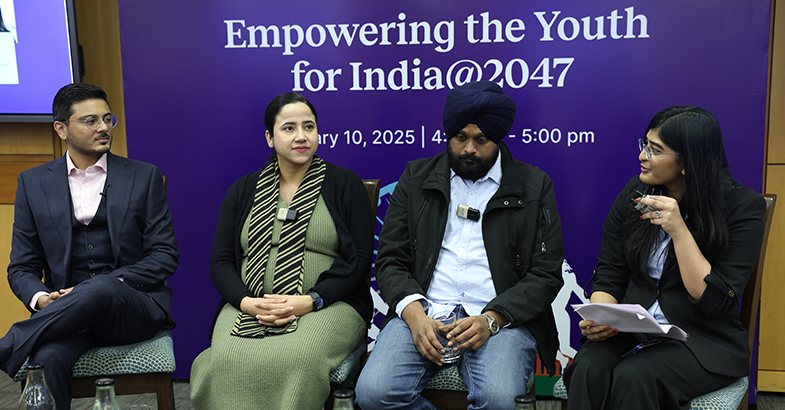
My professional journey – spanning strategy, public sector consulting, and entrepreneurship – has given me a front-row seat to how innovation and governance can shape societies. Working on strategy projects with government bodies and private sector leaders has made me appreciate the power of policy, education, and business in driving large-scale transformation. But what has stood out most is the undeniable role of young changemakers in this process.
At ISB, my journey has been about expanding this perspective – understanding how leadership, entrepreneurship, and policy come together to create impact. My involvement with the Women in Business Club has reinforced the importance of equipping individuals with the right skills, networks, and platforms to lead in an evolving world.
So, when I was invited to moderate the National Youth Day panel discussion at ISB, organised by the Office of External Relations at ISB in collaboration with TiE Chandigarh, I saw it as an opportunity to explore a fundamental question: How do we prepare India’s youth – who make up 65% of our population – to lead the country toward its centenary year of independence in 2047?
Key Themes of the Discussion
The discussion focused on some of the most pressing themes shaping India’s future:
- How educational institutions can redesign curriculums to equip students with future-ready skills.
- The essential competencies youth need to thrive in a rapidly evolving economy.
- The role of young entrepreneurs in transforming industries and creating employment.
- How India’s youth can lead in sustainability, climate action, and governance.
It was a deep dive into what youth empowerment actually means – beyond policy rhetoric and into actionable change.
Insights That Stuck With Me
Each panelist brought a unique perspective, but a few insights resonated deeply with me.
Dr. Darpan Ahluwalia, IPS, stressed the need for financial literacy as a core skill for today’s youth, advocating for its integration into school curriculums alongside vocational skills like coding and video editing. Her perspective reinforced that real empowerment comes when youth are equipped to navigate real-world financial and career decisions.
Simarpreet Singh, CEO, Hartek Group, introduced the principle (R, K, M)^T – Roti, Kapda, and Makaan (food, clothing, shelter) powered by Technology. His insights made me think about how startups can create real impact by solving for necessity, not just novelty. His approach emphasised that businesses addressing fundamental human needs through innovation will drive India’s entrepreneurial success.
Sumedh Sachdev, Founder & CEO, Lucria Consult, drawing from his experience in global business strategy, highlighted how young Indian entrepreneurs can build internationally competitive businesses. He stressed that success in global markets requires financial planning, adaptability, and a shift toward a global mindset. His insights reaffirmed that Indian talent has the potential to lead on the world stage – if given the right exposure and opportunities.
These weren’t just theoretical ideas; they were actionable insights that young professionals like me could apply in our own journeys.
Personal Takeaways and Looking Ahead
For me, this discussion wasn’t just about moderating – it was about learning and reflecting on where I can contribute. The conversation pushed me to think critically about gaps in the market, how youth-driven businesses can create impact, and how I can play a role in bridging these gaps.
It also reinforced something I’ve realised through my time at ISB and my experiences with the Women in Business Club – the power of networks and community-driven leadership. Whether in business, governance, or social impact, meaningful progress happens when leaders create opportunities for others to succeed.
I am incredibly grateful to ISB and TiE Chandigarh for the opportunity to lead this conversation. As we look toward 2047, it’s on all of us – students, educators, entrepreneurs, and policymakers – to move from inspiration to action.
The youth of today are not just preparing for the future – we are actively building it.

